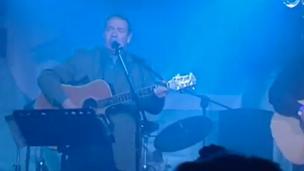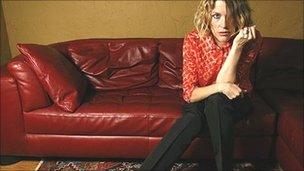Royalties change sees music artists' fees fall 80%
- Published

Veteran Welsh-language performer Dafydd Iwan says royalty collection in Wales needs a 're-think'
Welsh music artists and composers are considering setting up their own royalties collection group, after incomes fell by more than 80%.
The new body would provide licences to BBC Wales and S4C to broadcast music in return for a better deal on royalties.
It follows changes two years ago by the Performing Right Society (PRS) to the formula it used for Wales.
The PRS, which has more than 2,000 members in Wales, saw royalties drop from £1.6m in 2007 to £260,000 in 2009.
"The music business - it's never been easy, but the situation especially in the last two or three years has really struck home," said Emyr Glyn Williams, the man behind Ankstmusik Records, the label that put out Super Furry Animals, Catatonia and Gorkys Zygotic Mynci's first ever tracks.
"From just anecdotal evidence I know that people have given up, and people aren't just investing in projects. They are not seeing the future as something they can invest in, especially when they are dealing with music, records and recording and stuff like that."
The issue has been under discussion in Caernarfon, where a seminar was held by the Welsh Music Foundation.
A research paper recommends setting up a new Welsh royalties collection society as a way of clawing back more royalties cash from broadcasters.
The report, external says artists who broadcast on BBC Radio Cymru receive 49p for every minute of airtime, collected by PRS.
However, it says Radio Cymru is treated like an English local radio station, rather than a national broadcaster.
The report argues that if the station was available on the UK DAB network of digital stations, artists would earn £4.71 per minute, nearly ten times as much.
It said a Welsh-based royalities agency would be aiming to bring back in something more like the larger DAB royalties fees.
"Welsh language repertoire - Radio Cymru relies on that for its broadcasting," pointed out the report's joint author, Deian ap Rhisiart.

Artists like Cerys Matthews had their first break on smaller independent Welsh record labels
"If the whole composers and publishers en block declare they are terminating their membership with the PRS, then the BBC haven't got any choice but to deal with them - that's the scenario."
S4C would be in a similar position, and also be asked for extra cash, maybe not something the other joint author - Arwel Ellis Owen, now interim chief executive of S4C - considered at the time.
BBC Wales said it was ultimately a dispute between Welsh artists and PRS, and that is where it should be resolved.
A BBC Wales spokesperson said: "As a supporter of the Welsh language music industry, it is of concern to us that this dispute between PRS and its Welsh members still hasn't been resolved.
"PRS still currently decide on the level of payments and this is a matter for them to discuss with their members."
The PRS has its own views on the feasibility of setting up a Welsh performing rights body.
While it co-operated with the research, and even attended the Caernarfon seminar, it certainly does not support the idea of setting up a competitor.
"We are a well-oiled machine, and we have all the things in place to administer on behalf of all a members in Wales," said John Hywel Morris from PRS.
"We have over 2,000 PRS members in Wales - it's a very small fraction of people who have turned up here voicing their concerns.
"Yes, they are concerns that we take seriously. We've been in discussions with them for the last three years, and I speak to a lot of the people who have been hit.
"And we have been working to better reflect what the usage of Welsh language music is in general."
He said he believed that an alternative royalties system in Wales would not get off the ground.
However, one of those at the seminar, and one of the most well-known Welsh-language performers, Dafydd Iwan, disagreed.
He said: "I don't think the musicians and composers of Wales are well served by the present copyright bodies.
"I think we need a re-think. To set up a body for musicians based in Wales is the solution."
The future of the proposals for this new Welsh body will be tested further next month, when a meeting is held in Aberystwyth to decide if Welsh artists want to push ahead with the scheme.
- Published1 September 2010
- Published7 June 2010